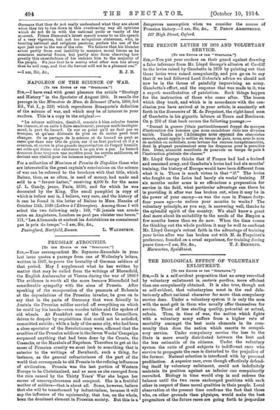PRUSSIAN ATROCITIES.
[To THE EDITOR or THE "SFECTATOE."1 SIR,—Your correspondent Mr. Seymour-Ramadale in your last issue quotes a passage from one of Wellesley's letters, written in 1807, to prove the brutality of German soldiers of that period. May I supplement what he has written by matter that may be culled from the writings of Bloomfield, the English Ambassador at Vienna during the war of 1866? The evidence is worth all the more because Bloomfield had considerable sympathy with the aims of Prussia. After speaking of the exasperation of the peasants of Bohemia at the depredations of the Prussian invader, he goes on to say that in the parts of Germany that were friendly to Austria the Prussian soldier carried off everything on which he could lay his hands—even wooden tables and the spokes of old wheels. At Frankfort one of the Town Councillors, driven to despair by requisitions that could not be satisfied, committed suicide ; while a lady of the same city, who had been a close spectator of the Revolutionary wars, affirmed that the cruelties of the Prussian soldiers in the Seven Weeks' Campaign surpassed anything that had been done by the Croats, the Cossacks, or the Marshals of Napoleon. Therefore to get at the cause of Prussian cruelty we must look to something that is anterior to the writings of Bernbardi, such a thing, for instance, as the general refractoriness of the part of the world that corresponds to old Prussia to the refining influences of civilization. Prussia was the last portion of Western Europe to be Christianized, and as soon as she emerged from the ruin caused by the Thirty Years' War she began her career of unscrupulousness and conquest. She is a fruitful mother of soldiers—that is about all. Some, however, believe that she will be transformed by industrialism, because it will sap the influence of the squirearchy, that has, on the whole, been the dominant element in Prussian society. But this is a
dangerous assumption when we consider the course of Prussian history.—I am, Sir, &o., T. PERCY ARMSTRONG.
127 High Street, Oxford.


































 Previous page
Previous page